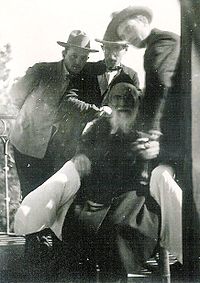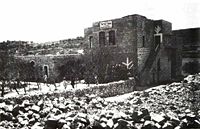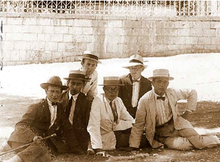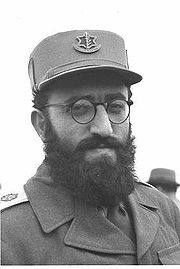- Hebron Yeshiva
-
Hebron Yeshiva, also known as Yeshivas Hevron, or Knesses Yisroel, and originally as Slabodka Yeshiva is known colloquially as the "mother of yeshivas" and was devoted to high level study of the Talmud. The yeshiva was located in the Lithuanian town of Slabodka, adjacent to Kovno (Kaunas), now Vilijampolė, a suburb of Kaunas. It functioned from the late 19th century until World War II.
Contents
Origins
From the second half of the 19th century, Kovno became a center of Jewish cultural activity in Lithuania. Prominent there were Yitzchak Elchanan Spektor (the "Kovner Rav"; officiated 1864-96); Abraham Mapu, one of the first modern Hebrew writers; and the first Yiddish literary critic, Ba'al Makhshoves (Israel Isidor Elyashev). The yeshivot of Slobodka became celebrated, in particular the Or Chayyim yeshivah, founded by Tzevi Levitan about 1863, which attracted students from other countries and was headed by noted scholars. Rabbi Nosson Tzvi Finkel, also known as "Der Alter fun Slabodka", (The Elder of Slabodka) introduced Musar ideals there. Its rosh yeshiva was Rabbi Moshe Mordechai Epstein; from 1881 it was known as the Slobodka yeshivah. Subsequently there was opposition among the students to the Musar method, and in 1897 the yeshivah was divided into two; the followers of Musar established the Keneset Israel yeshivah, named after Israel Lipkin (Salanter), while its opponents founded the Keneset Bet Yitzchak yeshivah, named after Yitzchak Elchanan Spektor.[1]
Relocation to Palestine
A 1924 edict requiring enlistment in the military or supplementary secular studies in the yeshiva led a large number of its students to relocate to Hebron. Rabbi Finkel sent Rabbi Avraham Grodzinski to head the group and establish the Yeshiva in Hebron.[2] Upon Rabbi Grodzinski's return to Slabodka, Rabbi Finkel transferred the Mashgiach Ruchni responsibilities to him, and the Rosh Yeshiva duties to Rabbi Yitzchok Isaac Sher, and Rabbi Finkel moved to Hebron to lead the yeshiva there.[3] Hebron was chosen over Jerusalem to avoid the influence of the conservative old yishuv.[citation needed] The Slabodka yeshiva ceased operation during the Holocaust. A branch was also established in Bnei Brak (see Slabodka yeshiva (Bnei Brak)).
1929 Hebron massacre
24 students were murdered in the 1929 Hebron massacre, and the yeshiva was reestablished in the Geula neighbourhood of Jerusalem. Despite a delay after the death of Rabbi Moshe Hebroni, the last of the previous generation, the yeshiva moved into a new and larger campus in the south-central Giv'at Mordechai neighbourhood in 1975.
Prominent alumni
- Rabbi Meyer Abovitz
- Rabbi Yehuda Amital
- Rabbi Yechezkel Abramsky
- Rabbi Zvi Block
- Rabbi David Cohen
- Rabbi Yeshayo Chalomish
- Rabbi Yisroel Zvi Yoir Danziger, of Aleksander
- Rabbi Aaron Tzvi Eisenberg
- Rabbi Baruch Mordechai Ezrachi
- Rabbi Tzvi Hirsch Ferber
- Rabbi Shlomo Goren
- Rabbi Avraham Grodzinski
- Rabbi Reuven Grozovsky
- Rabbi Yitzchok Hutner
- Rabbi Meyer Juzint
- Rabbi Yaakov Kamenetsky
- Rabbi Avraham Elya Kaplan
- Rabbi Aharon Kotler
- Rabbi Shneur Kotler
- Rabbi Yeruchem Meyer Lampert
- Rabbi Yeruchom Levovitz
- Rabbi Dovid Leibowitz
- Rabbi/Professor Saul Lieberman
- Rabbi Moshe Yakov Mendelowitz
- Rabbi Avigdor Miller
- Rabbi Alter Polack
- Rabbi Yaakov Yitzchok Ruderman
- Rabbi Yechezkel Sarna
- Rabbi Elazar Shach
- Rabbi Avraham Shapira
- Rabbi Moshe Shatzkes
- Rabbi Zalman Sorotzkin
- Rabbi Selig Starr
- Rabbi Naftoli Trop
- Rabbi Yechiel Yaakov Weinberg
- Professor Harry Austryn Wolfson
- Rabbi Nissan Yablonsky, Rosh Yeshiva of Hebrew Theological College
See also
- 1929 Hebron massacre
- Kovno Kollel
- Slabodka yeshiva (Bnei Brak)
References
External links
Coordinates: 54°54′24″N 23°53′02″E / 54.90667°N 23.88389°E
Categories:- History of Kaunas
- Hebron
- Musar movement
- Yeshivas of Lithuania
Wikimedia Foundation. 2010.





